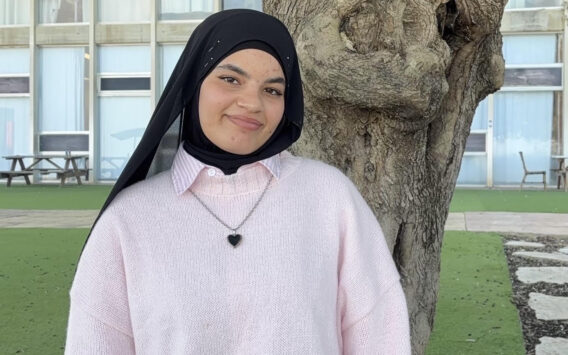At just 20 years old, Salma Ghaben is already a powerful example of the values University of Haifa holds dear: academic excellence, diversity, and coexistence. A second-year student studying Sociology and Special Education, Salma is part of the University’s vibrant Arab student population, which comprises over 30% of the student body. Raised in the village of Tur’an and inspired by her parents, both University of Haifa alumni, Salma chose to follow in their footsteps not only because of the school’s strong academic reputation, but because of its commitment to fostering a shared space where Jewish and Arab students can learn, grow, and build bridges together. Her story reflects the quiet determination of a new generation working toward meaningful change, both in the classroom and in society.
Q: Can you tell us about what brought you to University of Haifa?
A: My parents’ connection to the University really drew me here. I grew up visiting the campus with them and always had this feeling of belonging. It was familiar, and I felt a deep connection.
Q: What made University of Haifa stand out for you as a place to study?
A: Besides my family’s connection, the academic level here is very high, especially when I compare it to other universities, even internationally. The social environment here also made a difference. I felt like I belonged. There’s a significant Arab student population, which helped me a lot, especially with adjusting to university life.
Q: Was language a challenge for you when you started?
A: Yes, very much. I grew up speaking Arabic and had never really been in an environment with native Hebrew speakers. My Hebrew wasn’t strong at the beginning. It was hard for me to express myself. But my English is good, and that helped me bridge the gap. Over time, I improved my Hebrew. It’s not perfect, but it’s much better now.
Q: You’re studying Special Education. What drew you to that field?
A: At first, I wanted to study Occupational Therapy, but I didn’t meet the entry requirements. Special Education was close to that field, so I chose it instead—and I found that I really enjoy it. I’ve visited schools here in Haifa and had some exposure to working with children with special needs. I want to be able to help them progress and make a real difference in their lives. That feeling of contributing to someone’s growth and improvement is what motivates me.
Q: Do you plan to continue your studies after graduation?
A: Yes, I hope to continue with a master’s degree—maybe in Autism Studies or Occupational Therapy. I’m still exploring my options. I graduate in 2026, so I have some time to decide.
Q: How has your overall experience at the University of Haifa been so far?
A: The past couple of years have been tough for everyone. There were tensions, especially between different student groups. But I see positive changes happening. I’m part of a leadership scholarship called the Jewish-Arab Leadership program—a joint initiative where we meet weekly to talk, share our experiences, and build trust. It’s created a safe space for dialogue, even when the conversations are difficult. We’re working to break down stereotypes, and I think we’re succeeding.
Q: What else do you do in your spare time?
I’m an active member of AJEEC (Arab-Jewish Center for Empowerment, Equality, and Cooperation – Negev Institute for Strategies of Peace and Economic Development) and am part of their leadership program. AJEEC-NISPED is an Arab-Jewish organization for social change that was established in the Negev. The organization is made up of a joint team of Arabs and Jews who work together to create an equal, shared society, which allows Arabs and Jews to coexist while preserving their identity and culture. This is a big part of my community-based activism.
Q: Do you think you’ll stay in Haifa after graduation?
A: I’m not sure yet. That depends on a few things, including my future family plans. But I do know I want to continue in this field and be in a place where I can grow professionally and personally. I’m still figuring it out. But I know I want to keep learning and help people with special needs. I also want to build a family someday. For now, I’m focusing on my degree and contributing to the communities around me.
Q: Is there anything else you’d like to share?
A: Just that I’m grateful for the opportunities I’ve had here—the academic environment, the support systems, and the chance to be part of a diverse and growing community.

